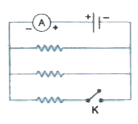An ammeter should have very low resistance, so that it may
not burn out
show large deflection
have better stability
not change the value of the current
The correct Answer is:D
Step by step video, text & image solution for An ammeter should have very low resistance, so that it may by Physics experts to help you in doubts & scoring excellent marks in Class 12 exams.
Updated on:21/07/2023Topper's Solved these Questions
- MAGNETIC EFFECT OF ELECTRIC CURRENTBOOK - TARGET PUBLICATIONCHAPTER - MAGNETIC EFFECT OF ELECTRIC CURRENTEXERCISE - CRITICAL THINKING
68 Videos
- MAGNETIC EFFECT OF ELECTRIC CURRENTBOOK - TARGET PUBLICATIONCHAPTER - MAGNETIC EFFECT OF ELECTRIC CURRENTEXERCISE - COMPETITIVE THINKING
111 Videos
- KINETIC THEORY OF GASES AND RADIATION BOOK - TARGET PUBLICATIONCHAPTER - KINETIC THEORY OF GASES AND RADIATION EXERCISE - Evaluation test
18 Videos
- MAGNETISMBOOK - TARGET PUBLICATIONCHAPTER - MAGNETISMEXERCISE - EVALUATION TEST
14 Videos
Similar Questions
A ammeter should have small resistance. Why?
View SolutionWhich of the following statements are correct ?
(1) Voltmeter should have high resistance.
(2) Ammeter should have low resistance.
(3) Voltmeter is placed in parallel across the conductor in a circuit.
(4) Ammeter is placed in parallel across the conductor in a circuit.
View Solution
Knowledge Check
Mark out the correct options
(i) An ammeter should have small resistance
(ii) An ammeter should have large resistance
(iii) A voltage should have small resistance
(iv) A voltage should have large resistance.A(i),(ii)B(ii),(iii)C(iii),(iv)D(i),(iv)Assertion : An ammeter is always connected in series whereas a voltmeter is connected in parallel.
Reason : An ammeter is a low-resistance galvanometer while a voltmeter is high resistance galvanometer.AAssertion is True, Reason is True, Reason is a correct explanation for AssertionBAssertion is True, Reason is True, Reason is not a correct explanation for AssertionCAssertion is True, Reason is FalseDAssertion is False, Reason is TrueAssertion : Resistance of an ammeter is less than the resistance of a milliammeter.
Reason : Value of shunt required in case of ammeter is more than a milliammeter.AIf both Assertion and Reason are true and Reason is the correct explanation of Assertion.BIf both Assertion and Reason are true and Reason is not correct explanation of Assertion.CIf Assertion is true but Reason is false.DIf Assertion is false but Reason is true.
Why should an ammeter have a low resistance and a high current carrying capacity?
View SolutionWhile convertying galvanometer into an ammeter, how does the parallel low resistance (shunt) bring the required changes in the galvanometer?
View SolutionIn the given circuit diagram, the cell and the ammeter, both have negligible resistance. The resistances are identical. With the switch K open, the ammeter reads 0.6 A. What will be the ammeter reading when the switch is closed?

View SolutionThe resistance of a galvanometer is 100Ω. A shunt of 5Ω is connected to it to convert it into an ammeter. The internal resistance of the ammeter is
View SolutionA galvanometer of resistance 50Ω is converted into an ammeter by connecting a low resistance (shunt) of value 1Ω in parallel to the galvanometer, S. If full - scale deflection current of the galvanometer is 10 mA, then the maximum current that can be measured by the ammeter is -
View Solution
